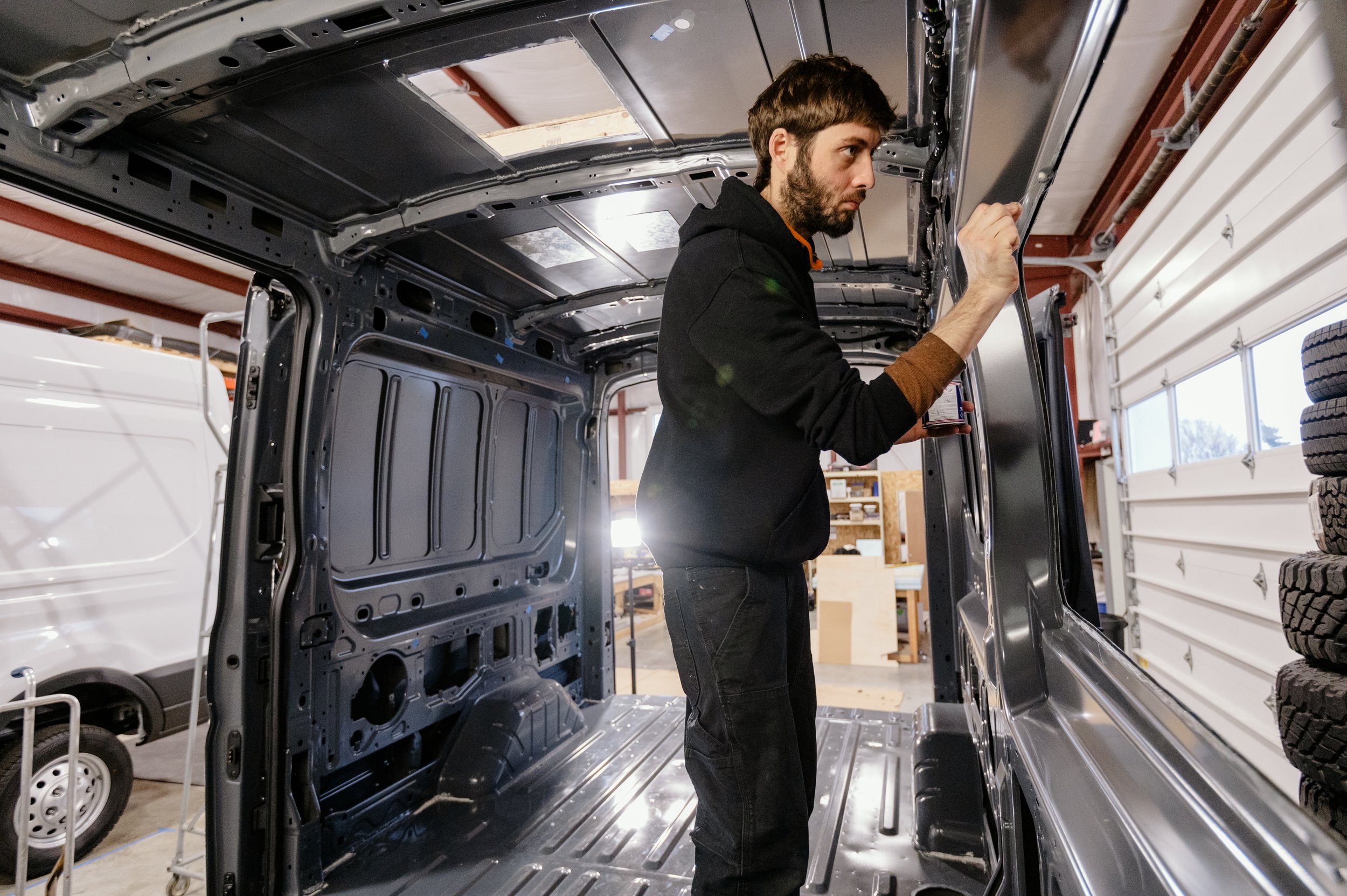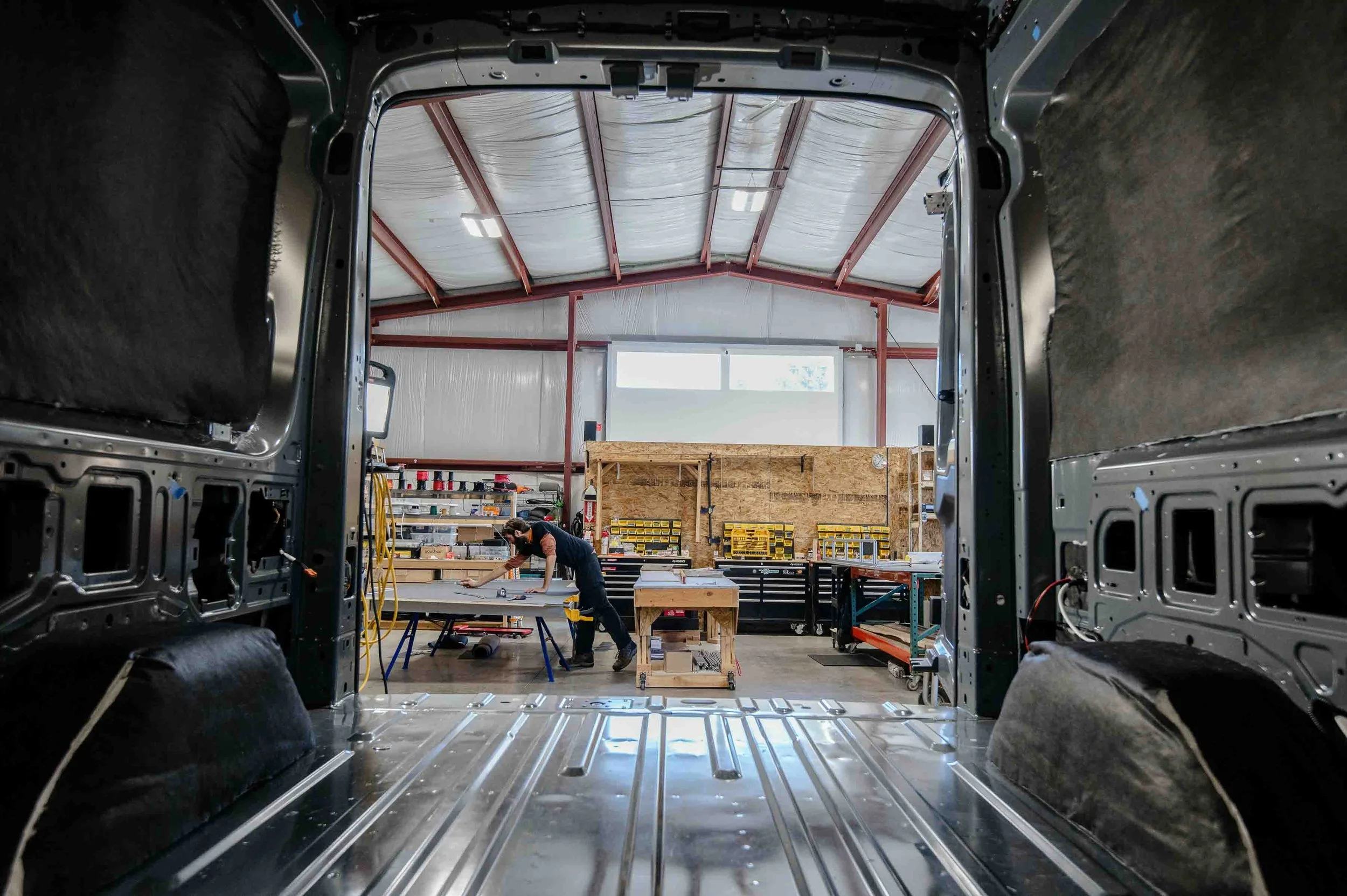What Does a Van Builder Do?
(And How to Tell If You’ve Found a Good One)
When most people imagine a van builder, they picture that guy — flip-flops, board shorts, hair in his eyes, waves crashing behind him while he’s installing cabinets in a parking lot. A cordless drill in one hand. Zero safety goggles. Sawdust drifting like confetti. Maximum vibes… minimum engineering.
But a professional van builder operates nothing like this beach-parking-lot legend. A reputable builder blends engineering, craftsmanship, safety standards, and real-world usability to create a vehicle your family can trust for years.
If you're shopping for a van builder, here’s what a high-quality, professional builder should be doing — and how Axis Vehicles approaches each area.
1. They Help You Choose the Right Vehicle Platform (and Explain Why the Chassis Is NOT the Place to Cut Corners)
A high-quality van builder knows that the foundation of every great adventure vehicle is the chassis itself. Not the cabinets. Not the flooring. Not the “van life” accessories.
The van—its frame, engine, drivetrain, and long-term serviceability—is what determines whether your build is a wise investment or a rolling piece of regret.
A great builder will tell you this directly: If the chassis won’t last, the build won’t either.
No amount of electrical upgrades or beautiful cabinetry can compensate for a van that isn’t mechanically sound or built to go the distance.
This is why reputable builders spend serious time helping customers make smart chassis decisions instead of rushing into the fun part (wood grain and gear drawers).
A Great Builder Will Never Let You Skimp on the Chassis
A trusted, professional builder will guide you through questions like:
How many miles can this chassis realistically last after the build?
Has the van been well maintained?
Are parts and service reasonably accessible in the regions you’ll travel?
Does the drivetrain (AWD, RWD, 4x4) match your terrain and climate?
Does the van have a clean history with no flood, rust, or collision concerns?
Is its long-term reliability strong enough to justify a $50k–$120k conversion?
They’ll also be upfront when a customer’s desired platform simply isn’t a good match for their needs, budget, or expectations.
A high-quality builder is not afraid to say: “I wouldn’t recommend building on this one. It’s not going to last.”
Why the Chassis Matters
A van build is essentially a home on wheels. The electrical system, heater, batteries, cabinets, and flooring are all designed to last for years—but only if the chassis underneath them does too.
This is why professional builders discourage customers from:
Building on vehicles with major mechanical issues
Ignoring rust or frame damage
Buying a van from a known rust state
Choosing a van with limited parts availability or expensive repair pathways
Selecting a chassis solely because it’s cheap
A good builder protects your long-term investment, not just your short-term excitement.
What to Expect From a Reputable Builder During Chassis Selection
When choosing a van builder, customers should look for someone who helps you evaluate:
1. Vehicle Longevity - Can the van realistically serve your family for many years after the build is completed?
2. Real Maintenance & Repair Accessibility - Does the platform have a solid network of mechanics and parts availability?
3. Suitability for Your Driving Conditions - Snow, dirt roads, highway miles, mountain passes, daily-driver convenience — drivetrain matters.
4. True Cost of Ownership - Fuel type, preventative maintenance, parts cost, and long-term service needs matter just as much as the purchase price.
5. When a Used Chassis Is a Smart Idea - A well-maintained used Transit, Sprinter, ProMaster, or E-Series can be an excellent foundation — if its service history checks out.
6. When a Used Chassis Is Not a Smart Idea - Rust, mystery maintenance, engine problems, flood damage, or questionable repairs are all red flags. A reputable builder will not build on these.
Where Axis Fits In
Axis Vehicles helps customers make confident, informed chassis decisions by evaluating:
Mechanical condition
Service and maintenance history
Mileage and age ranges that support long-term use
Drivetrain fit for your terrain and lifestyle
Budget vs. longevity considerations
Real-world serviceability
Whether the van can reliably support years of family travel
But Axis goes a step further. When a customer doesn’t already have a van, Axis handles the sourcing process from start to finish.
Axis will:
Source a chassis that fits your budget and build requirements
Evaluate all critical points (service history, drivability, options, rust, frame, drivetrain, factory features)
Handle communication and negotiation with the dealership
Provide a complete Window Sticker, Purchase Order, and all remaining warranty details
Ensure you're buying a chassis strong enough to justify a high-quality build
This protects customers from purchasing the wrong van, overpaying, or unknowingly investing in a platform that won’t last.
2. They Design an Interior Layout That Puts Safety First
A good van builder is not just a carpenter — they are a space designer, problem-solver, and safety engineer.
What customers should expect:
Layouts that consider weight distribution
Seating systems that are structurally anchored to the van frame
Storage zones for gear, food, and clothing
Sleeping systems that actually fit the number of people you’re traveling with
Ventilation and electrical placement that reduces heat/moisture issues
If a builder is only talking about “aesthetics,” run.
Where Axis fits in:
Axis designs layouts that prioritize modular seating, crash-tested seating options, family-friendly sleep configurations, and gear zones built for PNW outdoor lifestyles.
3. They Use Proper Insulation, Wall, and Flooring Techniques
This is where many DIY and budget builders go wrong. Moisture, mold, and non-serviceable flooring can ruin a van faster than any pothole.
What buyers should look for:
Use of name-brand insulation materials with known thermal and acoustic characteristics (e.g., 3M Thinsulate)
Wall and ceiling materials that allow airflow AND future access if wiring or components need service
Flooring that can withstand dirt, water, boots, mud, pets, and daily use
Where Axis fits in:
Axis uses commercial-grade flooring (Lonseal or 2tec2), bamboo, baltic birch and 3M Thinsulate because they align with long-term durability and moisture awareness.
4. They Install a Reliable Electrical System (Professionally)
Power is one of the most complex parts of a van build — and also the easiest place for shortcuts or over-engineering.
What customers should expect with a reputable builder:
Uses brand-name lithium batteries with well-documented performance and warranty
Installs wiring to code and protects wires where abrasion might occur
Provides a clear, labeled system you can understand and service
Offers inverter/charger options that fit your real needs (not just “more is better”)
Where Axis fits in:
Axis designs electrical systems are marine grade and built around reliable lithium solutions with simplified user interfaces.
5. They Integrate Heat & Climate Systems for Real Four-Season Travel
If you’re traveling anywhere with winter temps, reliable heat is essential.
What buyers should expect:
A heater matched to the fuel type of the van
An installation that keeps combustion safely outside the cabin
Proper routing of intake/exhaust
Clear instructions for use and maintenance
Fuel-fed heaters (diesel or gasoline, depending on van type) are the industry standard for reliable four-season travel.
Where Axis fits in:
Axis installs Eberspacher gasoline heaters for seamless integration with the van’s existing fuel system.
6. They Prioritize Safety in Every Build Decision
A great van builder doesn’t talk only about “looks” — they talk about engineering.
Safety markers customers should look for:
Cabinetry bolted through the van’s metal body, not into wall panels
Crash-tested seating where passengers will ride
Proper fusing, wire gauges, and grounding
Consideration of how items behave during sudden braking or collisions
You should feel safe putting your kids or grandkids in the back.
Where Axis fits in:
Axis uses through-body anchoring and reputable seating systems to ensure real-world safety.
7. They Offer a Transparent, Documented Build Process
A quality builder has structure. A predictable timeline. A clear communication rhythm.
Buyers should look for:
A discovery or planning call
Documented pricing and options
A build plan or spec sheet
A realistic timeline — not “we’ll just have to see or I’m not sure”
A thorough delivery walkthrough
Where Axis fits in:
Axis follows a documented process that includes a discovery call, detailed pricing review, a four-week build window, and a full system walkthrough at delivery.
8. They Provide Ongoing Support, Warranty, and Upgrade Pathways
A van build is a long-term investment — your builder should still be around after delivery day.
What buyers should look for:
A written warranty
Access to future service or upgrades
Phone or email support when questions arise
Ability to replace or repair components if needed
If a builder says, “We don’t really do repairs,” that’s a red flag.
Where Axis fits in:
Axis offers a 5-year craftsmanship warranty and in-house service/upgrades.
Bottom Line: A Great Van Builder Isn’t Just Building a Van — They’re Building Your Lifestyle Tool
The best van builders focus on:
Safety
Function
Durability
Serviceability
Long-term ownership
Everything else — colors, woodgrain, LED twinkle lights — comes later.
If you want to learn more about whether a professionally built van is right for your family, you can explore build options or reach out here.






